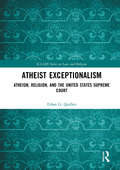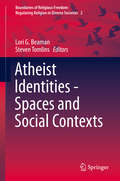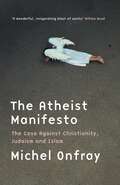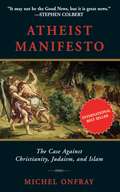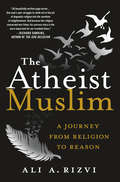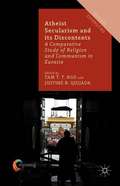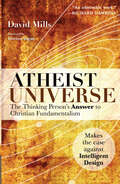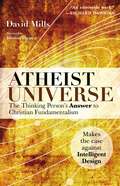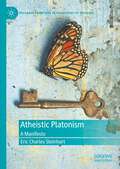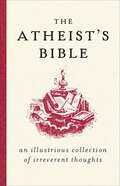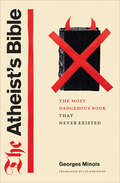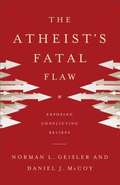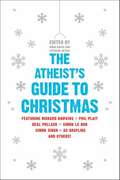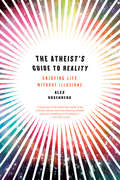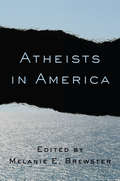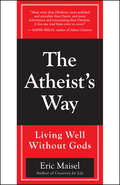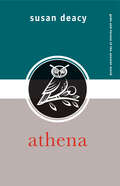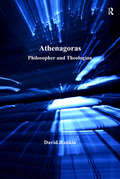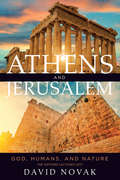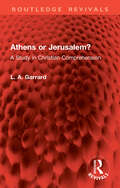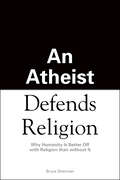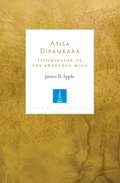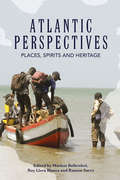- Table View
- List View
Atheist Exceptionalism: Atheism, Religion, and the United States Supreme Court (ICLARS Series on Law and Religion)
by Ethan G. QuillenDue to its Constitution, and particularly to that Constitution’s First Amendment, the relationship between religion and politics in the United States is rather unusual. This is especially the case concerning the manner with which religious terminology is defined via the discourse adopted by the United States Supreme Court, and the larger American judicial system. Focusing on the religious term of Atheism, this book presents both the discourse itself, in the form of case decisions, as well as an analysis of that discourse. The work thus provides an essential introduction and discussion of both Atheism as a concept and the influence that judicial decisions have on the way we perceive the meaning of religious terminology in a national context. As a singular source on the Supreme, Circuit, and District Court cases concerning Atheism and its judicial definition, the book offers convenient access to this discourse for researchers and students. The discursive analysis further provides an original theoretical insight into how the term ‘Atheism’ has been judicially defined. As such, it will be a valuable resource for scholars of religion and law, as well as those interested in the definition and study of Atheism.
Atheist Identities - Spaces and Social Contexts (Boundaries of Religious Freedom: Regulating Religion in Diverse Societies #2)
by Lori G. Beaman Steven TomlinsThe essays in this book not only examine the variety of atheist expression and experience in the Western context, they also explore how local, national and international settings may contribute to the shaping of atheist identities. By addressing identity at these different levels, the book explores how individuals construct their own atheist--or non-religious--identity, how they construct community and how identity factors into atheist interaction at the social or institutional levels. The book offers an interdisciplinary comparative approach to the analysis of issues relating to atheism, such as demography, community engagement, gender politics, stigmatism and legal action. It covers such themes as: secularization; the social context of atheism in various Western countries; the shifting of atheist identities based on different cultural and national contexts; the role of atheism in multicultural settings; how the framework of "reasonable accommodation" applies to atheism; interactions and relationships between atheism and religion and how atheism is represented for political and legal purposes. Featuring contributions by international scholars at the cutting edge of atheism studies, this volume offers unique insights into the relationship between atheism and identity. It will serve as a useful resource for academics, journalists, policy makers and general readers interested in secular and religious studies, identity construction and identity politics as well as atheism in general.
Atheist Manifesto: The Case Against Christianity, Judaism and Islam
by ONFRAY, MICHELNot since Nietzsche has a work so groundbreaking and explosive appeared, to question the role of the world's three major monotheistic religions. If Nietzsche proclaimed the death of God, French philosopher Michel Onfray starts from the premise that not only is God still very much alive but increasingly controlled by fundamentalists who pose a danger to the human race. Documenting the ravages from religious intolerance over the centuries, Onfray makes a strong case against the three religions for their obsession with purity and their contempt for reason and intelligence, individual freedom, desire and the human body, sexuality and pleasure, and for women in general. In their place, all three demand faith and belief, obedience and submission, extol the "next life" to the detriment of the here and now. Tightly argued, this is a work that is sure to stir debate on the role of religion in Australian society-and politics.
Atheist Manifesto: The Case Against Christianity, Judaism, and Islam
by Michel OnfrayThis hugely controversial work demonstrates convincingly how the world's three major monotheistic religions--Christianity, Judaism, and Islam--have attempted to suppress knowledge, science, pleasure, and desire, condemning nonbelievers often to death. Not since Nietzsche has a work so groundbreaking and explosive questioned the role of the world's three major monotheistic religions. If Nietzsche proclaimed the death of God, Onfray insists that not only is God still very much alive but also increasingly controlled by fundamentalists who pose a danger to the nature of human morality. Documenting the ravages of religious intolerance over the centuries, the author makes a strong case against the three religions for their obsession with purity and their contempt for reason and intelligence, individual freedom, desire, and the human body, as well as their disdain for women, sexuality, and pleasure. In their place, all three demand faith and belief, obedience and submission, extolling the "next life" to the detriment of the here and now. Tightly argued, this is a work that is sure to stir debate on the role of religion in American society--and politics.
Atheist Manifesto: The Case Against Christianity, Judaism, and Islam
by Michel Onfray Jeremy LeggattThis book is the about religion, atheism and secularism. It is a philosophical polemic against religions and a call for secularism.
The Atheist Muslim: A Journey from Religion to Reason
by Ali A. RizviIn much of the Muslim world, religion is the central foundation upon which family, community, morality, and identity are built. The inextricable embedment of religion in Muslim culture has forced a new generation of non-believing Muslims to face the heavy costs of abandoning their parents' religion: disowned by their families, marginalized from their communities, imprisoned, or even sentenced to death by their governments. Struggling to reconcile the Muslim society he was living in as a scientist and physician and the religion he was being raised in, Ali A. Rizvi eventually loses his faith. Discovering that he is not alone, he moves to North America and promises to use his new freedom of speech to represent the voices that are usually quashed before reaching the mainstream media--the Atheist Muslim.In The Atheist Muslim, we follow Rizvi as he finds himself caught between two narrative voices he cannot relate to: extreme Islam and anti-Muslim bigotry in a post-9/11 world. The Atheist Muslim recounts the journey that allows Rizvi to criticize Islam--as one should be able to criticize any set of ideas--without demonizing his entire people. Emotionally and intellectually compelling, his personal story outlines the challenges of modern Islam and the factors that could help lead it toward a substantive, progressive reformation.
Atheist Secularism and its Discontents
by Tam T. T. Ngo Justine B. QuijadaAtheist Secularism and Its Discontents takes a comparative approach to understanding religion under communism, arguing that communism was integral to the global experience of secularism. Bringing together leading researchers whose work spans the Eurasian continent, it shows that defining, co-opting and appropriating religion was central to Communist political practices. Indeed, it is precisely because atheism was so central to the communist project that atheism's others, superstition and religion, were essential to the communistexperience. Although all forms of communism sought to eradicate or limit religion, this book demonstrates that religious life under such regimes was unexpectedly rich, and that throughout the communist and post-communist world religious and political imaginaries are intimately intertwined.
Atheist Universe: The Thinking Person's Answer to Christian Fundamentalism
by David MillsUsing logic, common sense, philosophy, ethics, history, and science, the author rebuts every argument that claims to “prove” the existence of God.IS THERE REALLY A GOD?OR DOES GOD EXIST ONLY IN OUR HEADS?IS THE BIBLE TRULY GOD’S WORD?OR IS IT A JUMBLE OF FANCIFUL MYTHS?Atheist Universe details why God is unnecessary to explain the universe’s diversity, organization and beauty. Using simple, straightforward logic, this book rebuts every argument that claims to “prove” God’s existence.A comprehensive primer for countering today’s religious dogma, Atheist Universe addresses all the historical and scientific questions, including:•What is atheism, and why is it so misunderstood?•If God is a myth, then how did the universe appear?•Without God, is there an objective “right” and “wrong”?•What is the meaning of life without God?•Is there evidence of Jesus’s miracles and resurrection?•Can atheists explain “near death” experiences and medical miracles?•Can science and the Bible realistically be reconciled?•What is the behind-the-scenes relationship between politics and religion?“An admirable work.” —Richard Dawkins“David’s work will be very useful for anyone combating harmful religious beliefs. Honest, frank, and right to the point!”—Albert Ellis, Ph.D., father of modern psychotherapy, author of A Guide to Rational Living
Atheist Universe: The Thinking Person's Answer To Christian Fundamentalism
by David Mills Dorion SaganAtheist Universe details why God is unnecessary to explain the universe's diversity, organization and beauty. Using simple, straightforward logic, this book rebuts every argument that claims to "prove" God's existence.
Atheistic Platonism: A Manifesto (Palgrave Frontiers in Philosophy of Religion)
by Eric Charles SteinhartAtheistic Platonism is an alternative to both theism and nihilistic atheism. It shows how any jobs allegedly done by God are better done by impersonal Platonic objects. Without Platonic objects, atheism degenerates into an illogical nihilism. Atheistic Platonism instead provides reality with foundations that are eternal, necessary, rational, beautiful, and utterly mindless. It argues for a plenitude of mathematical objects, and an infinite plurality of possible universes. It provides mindless rational grounds for objective values, and for objective moral laws for the persons who evolve in universes. It defines a meaningful way of life, which facilitates self-improvement. Atheistic Platonists argue for computational theories of life after death. Atheistic Platonism includes a rich system of spiritual symbols. It values transformational practices and ecstatic experiences. Where atheisms based on materialism fail, atheisms based on Platonism succeed.
The Atheist's Bible: An Illustrious Collection of Irreverent Thoughts
by Joan KonnerA wise and witty collection of quips, quotes, and musings from the world’s greatest geniuses and jokers, proving that “all thinking men are atheists” (Ernest Hemingway)From Sophocles to Homer Simpson, The Atheist’s Bible celebrates the long and rich tradition of rejecting organized religion. Included here are insights and observations from scientists, writers, philosophers, and comedians throughout history who have questioned the wisdom (and sanity) of pious believers. Far from a cynical polemic, this “bible” shares the same joy, love of beauty, and human wonder that religious books of quotations provide, but with a healthy dose of independent thought and without dogma.
The Atheist's Bible: The Most Dangerous Book That Never Existed
by Georges MinoisThis intellectual history of a rumored book of heresy reveals a persistent undercurrent of atheism from the Middle Ages into the 18th century. In 1239, Pope Gregory IX accused Frederick II, the Holy Roman Emperor, of heresy. Without disclosing evidence of any kind, Gregory announced that Frederick had written a supremely blasphemous book—De tribus impostoribus, or the Treatise of the Three Impostors—in which Frederick denounced Moses, Jesus, and Muhammad as impostors. Of course, Frederick denied the charge, and over the following centuries the story played out across Europe, with libertines, freethinkers, and other &“strong minds&” seeking a copy of the scandalous text. The fascination persisted until finally, in the eighteenth century, someone brought the purported work into actual existence—in not one but two versions, Latin and French. Although historians have debated the origins and influences of this most apocryphal book, there has not been a comprehensive biography of the Treatise of the Three Impostors. In The Atheist&’s Bible, historian Georges Minois tracks the course of the book from its origins in 1239 to its most salient episodes in the seventeenth and eighteenth centuries, introducing readers to the colorful individuals obsessed with possessing the legendary work—and the equally obsessive passion of those who wanted to punish people who sought it. Minois&’s compelling account sheds much-needed light on the power of atheism, the threat of blasphemy, and the persistence of free thought during a time when the outspoken risked being burned at the stake. &“[A] timely and elegant study…Readers who are intrigued or scandalized by the diatribes of Richard Dawkins or Christopher Hitchens will discover in The Atheist&’s Bible that, as that other Bible says, there is nothing new under the sun.&”—Walter Stephens, author of Demon Lovers
The Atheist's Fatal Flaw: Exposing Conflicting Beliefs
by Norman L. Geisler Daniel J. MccoyMost critiques of atheism focus on refuting head-on the claims of atheists. Instead, this unique book faithfully represents what atheists say they believe and stands back to watch as the natural inconsistencies in that worldview inevitably rise to the surface. Norman L. Geisler, the apologetic giant of our time, is joined by Daniel J. McCoy, highlighting two inconsistencies in particular. First they examine the atheist's assertion that God cannot exist because there is evil in the world and that if God truly existed, he would intervene. These same people then turn around and say any intervention on God's part would impose upon human autonomy, and thus would be unjust. Second, these very interventions that would be considered immoral if imposed upon the earth by God are lauded when they stem instead from some human institution or authority. Geisler and McCoy highlight this kind of "doublethink" step by step, showing readers how to identify such inconsistencies in atheistic arguments and refute them--or rather show atheists how they refute themselves.
The Atheist's Guide to Christmas
by Robin Harvie and Stephanie MeyersThis funny, festive, and thoughtful collection delves into age-old holiday questions for the non-believer—like what do you get an atheist for Christmas?If you’re an atheist, you don’t believe in the three wise men, so this Christmas, we bring you not three, but forty-two wise men and women, bearing gifts of comedy, science, philosophy, the arts, and knowledge. What does it feel like to be born on Christmas day? How can you most effectively use lights to make your house visible from space? And where can you listen to the echoes of the Big Bang on December 25? The Atheist’s Guide to Christmas answers all these questions and more:Richard Dawkins tells an original Christmas story.Phil Plait fact-checks the Star of Bethlehem.Neal Pollack teaches his family a lesson on holiday spirit.Simon Singh offers a very special scientific experiment.Simon le Bon loses his faith (but keeps church music).AC Grayling explains how to have a truly happy Christmas.Plus thirty-six other brilliant, funny, free-thinking pieces perfect for anyone who doesn’t think of holidays as holy days.
The Atheist's Guide to Reality: Enjoying Life without Illusions
by Alex RosenbergA book for nonbelievers who embrace the reality-driven life. We can't avoid the persistent questions about the meaning of life-and the nature of reality. Philosopher Alex Rosenberg maintains that science is the only thing that can really answer them--all of them. His bracing and ultimately upbeat book takes physics seriously as the complete description of reality and accepts all its consequences. He shows how physics makes Darwinian natural selection the only way life can emerge, and how that deprives nature of purpose, and human action of meaning, while it exposes conscious illusions such as free will and the self. The science that makes us nonbelievers provides the insight into the real difference between right and wrong, the nature of the mind, even the direction of human history. The Atheist's Guide to Reality draws powerful implications for the ethical and political issues that roil contemporary life. The result is nice nihilism, a surprisingly sanguine perspective atheists can happily embrace.
Atheists in America
by Brewster Melanie E. Ed.This collection features more than two dozen narratives by atheists from different backgrounds across the United States. Ranging in age, race, sexual orientation, and religious upbringing, these individuals address deconversion, community building, parenting, and romantic relationships, providing a nuanced look at living without a god in a predominantly Christian nation.These narratives illuminate the complexities and consequences for nonbelievers in the United States. <P><P>Stepping away from religious belief can have serious social and existential ramifications, forcing atheists to discover new ways to live meaningfully without a religious community. Yet shedding the constraints of a formal belief system can also be a freeing experience. Ultimately, this volume shows that claiming an atheist identity is anything but an act isolated from the other dimensions of the self. Upending common social, political, and psychological assumptions about atheists, this collection helps carve out a more accepted space for this minority within American society.
Atheists in America
by Melanie E. BrewsterThis collection features more than two dozen narratives by atheists hailing from different backgrounds across the United States. Ranging in age, race, sexual orientation, and firmness in their irreligiosity, these individuals address religious deconversion, community building, parenting, and romantic relationships, providing a nuanced look at living without God in a predominantly Christian nation.These narratives illuminate the complexities and consequences for nonbelievers in the United States. Stepping away from religious belief can have serious social and existential ramifications, forcing atheists to discover new ways to live meaningfully without the guidance of a religious community. Yet shedding the constraints of a formal belief system can also be a freeing experience. Ultimately, this volume shows that claiming an atheist identity is anything but an act isolated from the other dimensions of the self. Upending common social, political, and psychological assumptions about atheists, this collection helps carve out a more accepted space for this minority to live within American society.
The Atheist's Way: Living Well Without Gods
by Eric MaiselIn The Atheist’s Way, Eric Maisel teaches you how to make rich personal meaning despite the absence of beneficent gods and the indifference of the universe to human concerns. Exploding the myth that there is any meaning to find or to seek, Dr. Maisel explains why the paradigm shift from seeking meaning to making meaning is this century’s most pressing intellectual goal.
Athena (Gods and Heroes of the Ancient World #Vol. 7)
by Susan DeacyIn this definitive assessment of the various representations and approaches to Athena, Susan Deacy does what no other has done before and brings all the aspects of this legendary figure into one, outstanding study. A survey of one of the most enduringly popular of ancient deities, the book introduces Athena’s myth, cult and reception, while directing the reader to detailed discussion as and when it is appropriate. Students will find it a great help in their studies, and for the general reader with an interest in the ancient world and for those from related disciplines such as literature, art history and religion, it provides a mine of information and insight into this fascinating classical figure.
Athenagoras: Philosopher and Theologian
by David RankinAthenagoras of Athens was a Christian thinker of the second century who engaged with contemporary philosophical thought in the matters of the divine, and the relationship of that divine to the material world. While clearly a Christian apologist, Athenagoras presents doctrines of God, of the Holy Trinity, and of other theological matters which clearly evidence an engagement with Greek philosophical thought which goes beyond the merely linguistic and embraces the notion of God as true being. Athenagoras is a Church Father who has not been given great attention in twentieth-century and early twenty-first-century scholarship. This book explores Athenagoras' undeniable place in the development of Christian thought on the divine, on the Trinity, on the human person, and on the resurrection. His work provides an important link between the mid-second-century and the work of Justin and that of the third-century Christian theologians of the East.
Athens and Jerusalem: God, Humans, and Nature (The Kenneth Michael Tanenbaum Series in Jewish Studies)
by David NovakWhat is the relation of philosophy and theology? This question has been a matter of perennial concern in the history of Western thought. Written by one of the premier philosophers in the areas of Jewish ethics and interfaith issues between Judaism and Christianity, Athens and Jerusalem contends that philosophy and theology are not mutually exclusive. Based on the Gifford Lectures David Novak delivered at the University of Aberdeen in 2017, this book explores the commonalities and common concerns that exist between philosophy and theology on metaphysical, epistemological, and ethical questions. Where are they different and where are they the same? And, how can they speak to one another?
Athens or Jerusalem?: A Study in Christian Comprehension (Routledge Revivals)
by L. A. Garrard‘What has Athens to do with Jerusalem? What agreement is there between the Academy and the Church?’ Tertullian’s outburst is still being echoed in some quarters, notably in the Biblical Theology School, which tries to minimize the influence of Greek thought on the Christian tradition. There are some circles in the World Council of Churches which would use its new formula of doctrinal orthodoxy to exclude the Unitarians and Quakers. Yet as Ernest Scott wrote, ‘Liberty is inherent in the Christian Faith, and liberty always makes for difference’. Athens or Jerusalem? (first published in 1965), based on the Minns Lectures of 1963, is unique as it gives a comprehensive survey of Christian thought and is designed to show that it is an amalgam of elements from both Athens and Jerusalem, and other sources as well. It concludes with a consideration of the question: how far is it possible to diverge from the mainstream of Christianity without ceasing to be Christian?
An Athiest Defends Religion: Why Humanity Is Better Off with Religion than without It
by Bruce SheimanA new perspective. Defending religion as a cultural institution in the face of resurgent atheistic thought For centuries, the theism-atheism debate has been dominated by two positions: stringent believers committed to the "yes, there is a God" argument, and atheists vehemently driven to repudiate not only God, but also religion as a cultural institution. To date, this is the first and only mainstream book in which a nonbeliever criticizes atheism and affirms religion. An Atheist Defends Religion persuasively argues that religion is overwhelmingly beneficial for humanity, regardless of whether God exists, based on a new paradigm of 10 affirmative dimensions that make up religious experience. It also puts to rest the theory that religion is behind most of the world's sectarian violence by showing that religion becomes evil when it is politicized. Readers will learn they do not have to be fundamentalists to be believers, and about the value and benefits of religion itself.
Atisa Dipamkara: Illuminator of the Awakened Mind (Lives of the Masters)
by James B. AppleThe first-ever biography with selected writings of one of the greatest Indian Buddhist masters in history.Few figures in the history of Buddhism in Tibet have had as far-reaching and profound an influence as the Indian scholar and adept Atiśa Dīpaṃkara (982–1054). Originally from Bengal, Atiśa was a tantric Buddhist master during Vajrayana Buddhism’s flowering in India and traveled extensively, eventually spending the remaining twelve years of his life revitalizing Buddhism in Tibet. Revered by all the schools of Tibetan Buddhism, Atiśa and his students founded what came to be known as the Kadam school, whose teachings have influenced countless Buddhist masters. These teachings, cherished by all major traditions, are preserved by the Geluk in particular, the school of the Dalai Lamas. Although Atiśa was an influential practitioner and scholar of Tantra, he is best known for introducing many of the core Mahayana teachings that are widely practiced throughout the Tibetan Buddhist world, including the Stages of the Path to Awakening and Mind Training (lojong), as well as having contributed to highly influential commentaries on Madhyamaka that synthesize various schools of thought. This succinct biography of Atiśa’s life, together with a collection of translations, represents for the first time the full range of Atiśa’s contribution to Buddhism. As the most comprehensive work available on this essential Buddhist figure, this book is an indispensable resource for scholars and Buddhist practitioners alike.
Atlantic Perspectives: Places, Spirits and Heritage
by Markus Balkenhol Ruy Llera Blanes Ramon SarróFocusing on mobility, religion, and belonging, the volume contributes to transatlantic anthropology and history by bringing together religion, cultural heritage and placemaking in the Atlantic world. The entanglements of these domains are ethnographically scrutinized to perceive the connections and disconnections of specific places which, despite a common history, are today very different in terms of secular regimes and the presence of religion in the public sphere. Ideally suited to a variety of scholars and students in different fields, Atlantic Perspectives will lead to new debates and conversations throughout the fields of anthropology, religion and history.
